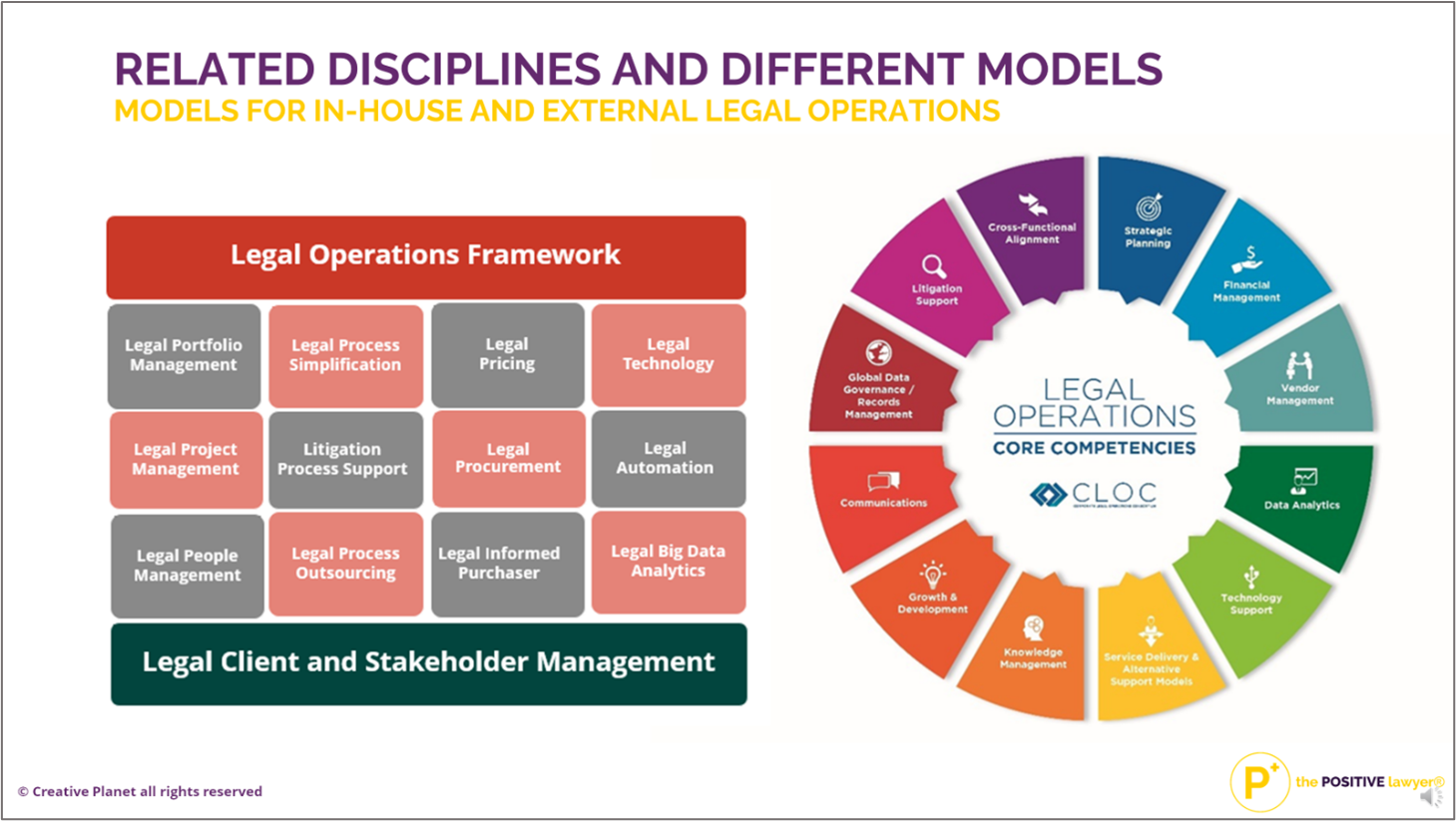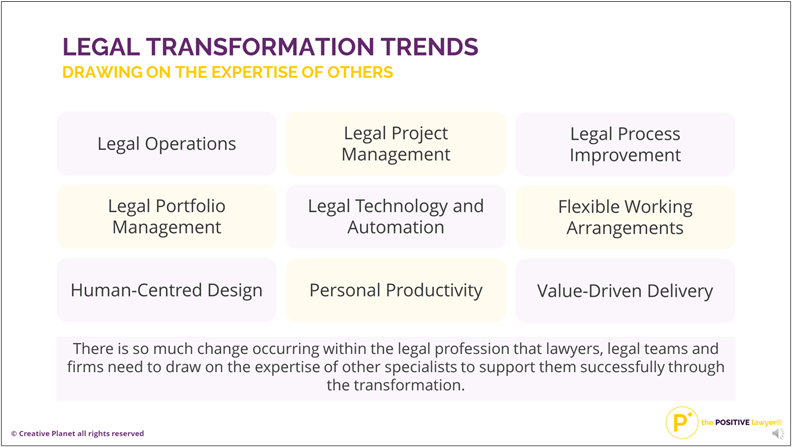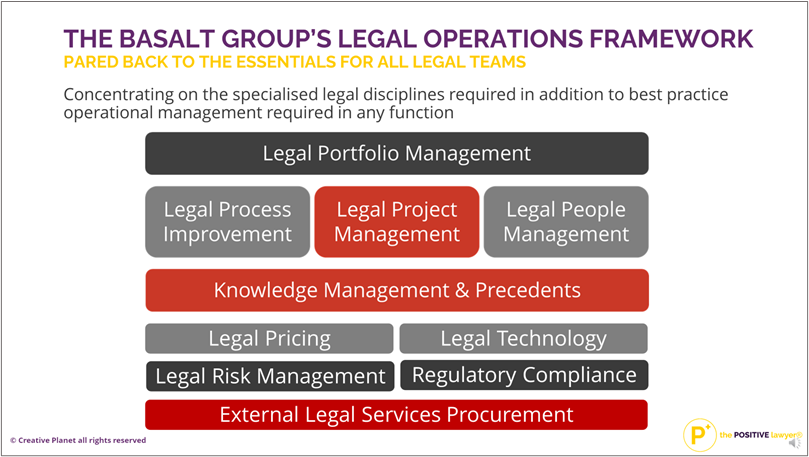DOWNLOAD THE FULL ARTICLE HERE
Essential skills for all In-house legal teams…and what external counsel also need to know!
The rules of the legal game have changed…get on board or get left behind!
Where did it all begin?
The Global Financial Crisis of 2008/09 triggered industry-changing events that led to different expectations about the way legal practice is conducted. There was less money available for legal work, a trend towards moving legal expertise in-house, and enormous cost pressures. All of a sudden, legal clients had dramatically different expectations around flexibility, transparency, predictability, and better delivery skills. Lawyers and firms could no longer get away with poor planning, cost blowouts, and time delays.
Over the last decade, this has resulted in new ways of working for all lawyers. The fields of Legal Operations, Legal Project Management, and Legal Process Improvement are gaining traction. Large firms can no longer use smoke and mirrors or pay lip service to these disciplines, evidence of changed practices is required.
What is Legal Operations?
It is useful for all lawyers to widen their perspective when considering how best to deliver legal outcomes for clients and stakeholders. Being great at the law is the gate opener and it is no longer enough to be a successful and happy lawyer
According to a survey conducted by the Association of Corporate Counsel in 2021, somewhere between 25% and 50% of all in-house legal teams have created legal operations functions. And a study conducted by EY Law and Harvard Law School Center on the Legal Profession also in 2021, found that 92% of law departments report they are already changing the way they operate using a range of approaches.
The Corporate Legal Operations Consortium (CLOC) provides this definition “Legal Operations is a multi-display function that optimizes legal services delivery to a business or government entity”.
There are many different models for Legal Operations and many disciplines that can be incorporated depending on your perspective, experience, and specific legal context.
CLOC has developed a model that encompasses 12 focus areas to support In-house legal teams to align with the business objectives of the organisations they serve and introduce new best practice tools and frameworks.
Many of the disciplines are the standard areas that any team of professionals needs to meet in order to function well and achieve their priorities within corporate and government organisations. Others are more specific to the legal aspects of the role and point to how the in-house legal teams can be run more effectively and efficiently, as well as disciplines around better engagement and management of external counsel as required.
Here at The BASALT Group and within The POSITIVE Lawyer, we take a more pared-back approach that is less intimidating and easier to implement. It is also equally applicable to ALL in-house and external legal teams. The slide below shows both frameworks.

These legal operations frameworks presented here are different combinations of all the disciplines that can be included under that banner. Sometimes various areas are combined into one operations team, such as Legal Automation, Legal Technology, and Legal Big Data Analytics, as well as Legal Procurement, Legal Informed Purchaser, and Legal Process Outsourcing.
Transformation of the legal profession
“In-house legal departments are under pressure from CEOs and CFOs to reduce their internal headcount, to spend less on law firms, and yet they have more legal and compliance work than ever before.
So, these clients need more legal service at less cost and this challenge will define the next ten years of the legal industry.” Richard Susskind
Susskind, a renowned academic and thought leader in the area of changing legal practice is well known for his book – The End of Lawyers? This quote perfectly explains the changes that are already underway and will continue to dictate the way in which in-house teams work and engage with external counsel. I observe this change as revolutionary rather than evolutionary.
Here are some more insights into the trends that have bought about the current situation where all in-house legal teams need to consider disciplines from the Legal Operations framework, and all external lawyers need to embed legal project management and legal process improvement into their ways of working.
Client needs and expectations changed. There were limited budgets for legal work, so they started to demand more reliability, transparency, and predictability. There was also a trend towards increasing the size of in-house teams and spending less with external firms. We saw the concepts of the Legal Informed Purchaser and Legal Project Management emerge and gain traction.
Ways of Working changed. Firms were going out of business and other forward-thinking firms started to explore concepts like Lean Six Sigma and the application of project management skills.
Innovation was occurring at a rapid pace with trends such as – legal outsourcing, legal offshoring, workflow, and process improvement, as well as improved technology adoption.
New skills emerged in the areas of legal project management, legal process improvement, and legal operations.
New roles become possible for non-lawyers and lawyers and the demand for Legal Project Managers and Legal Operations specialists have now gone through the roof!
All of this, coupled with new ways of working, means that lawyers require the expertise of other professionals in order to deliver their services and legal outcomes effectively.
The slide below sums up the other transformation trends that are also at play.

Going back to further findings from the interviews conducted with 2,000 participants in 2021by EY Law and the Harvard Law School Center on the Legal Profession, we can see the following pressures and challenges that are also facing organisations and their legal departments –
- “CEOs cite risk management as the area they expect to implement the most change in over the next three years, but a few General Counsel are “very confident” in their department’s abilities to identify, measure, and manage complex risk.
- Workloads are increasing faster than budgets and law departments are planning even more ambitious cost reductions. General Counsel expects workloads to increase by 25% over the next three years, yet 75% don’t expect budgets to keep pace. At the same time, many law department leaders are planning significant cost reductions that will require major operational changes.
- C-suites have not been persuaded to support critical investments in legal technology and process improvement. General Counsel report that increased use of technology offers the greatest opportunity for cost savings. Yet, law departments face challenges securing budget for technology and process improvement from the C-suite.
- Law departments continue to use traditional delivery methods despite mounting challenges. Many law departments report significant challenges with managing outside counsel and insourcing. Meanwhile, the use of self-service, centers of excellence, and co-sourcing strategies appear underused. Finding the right sourcing mix appears critical.”
Accessed March 2022 https://www.ey.com/en_au/law/general-counsel-imperative-barriers-building-blocks
Future of Law and Innovation (FLIP)
The concept of FLIP is becoming popular and most developed nations now have dedicated FLIP societies or specific chapters within their existing legal societies and associations.
As only the legal profession can, an inquiry was conducted into FLIP by the Law Society of NSW in 2017. The FLIP Report 2017 came up with 12 key findings and 19 recommendations. Here are the findings –
- Pressure from legal clients is increasing competition and the need for value and transparency
- New ways of working are proliferating
- In-house corporate lawyers are driving change – client-focussed service; legal technology, legal process improvement; and cost monitoring
- Changing cultures and increased use of technology
- New areas of work and new roles
- Artificial intelligence raises ethical and regulatory considerations
- Funding is urgently required to assist access to justice
- Law graduates of the future require new skills
- Change management techniques can enhance the well-being of lawyers when properly supported
- Flexible working arrangements are on the rise and are increasingly expected by legal talent
- Globalisation raises new opportunities and new threats for domestic firms
- Innovation and changing client behaviour require practical guidance for lawyers
Core Legal Operations Disciplines
Here at The BASALT Group, we like to keep things simple and focus on the areas that will have the most impact. This is a pared-back version of the various Legal Operations frameworks and considers the more recent trends and pressures that are facing in-house legal teams. Get these right and most of the outcomes expected as part of legal transformation will be delivered.

Based on experience working with many in-house teams over the last decade, the following are the core disciplines to implement and get right to gain the most benefit from legal operations concepts –
- Legal Portfolio Management – gives you visibility of the resourcing, priorities, and milestones of each matter – your team won’t miss a deadline again!
- Legal Process Improvement – brings it all together into repeatable, standardised processes – be confident that all work products are of great quality!
- Legal Project Management – provides the clarity and communication mechanisms to ensure every matter is delivered on time and on budget according to the agreed scope – it’s time to delight your clients and stakeholders!
- Legal People Management – supports you to lead and inspire your teams to increase productivity, provide clear direction and improve engagement – happy people do better work!
- Knowledge Management – provide the scaffolding to turn tacit knowledge into explicit knowledge – get it right the first time, every time!
It is also worth ensuring in-house legal teams are also well supported in the following supporting disciplines –
- Legal Pricing often leads the way in terms of pressure from clients to provide more transparency around the price of legal work or alternative fee arrangements – LPM and LPI underpin profitable fixed price work and transparent pricing!
- Legal Technology supports all legal delivery and management activities and doesn’t always need to be high-tech or high-cost – technology enables transformation when people and processes come first!
External Legal Services Procurement
I’ve previously written two articles on the concepts of informed purchasing of legal services. These concepts are directly applicable to the Legal Operations discipline area of External Legal Services Procurement.
The concept of being an ‘Informed Purchaser’ or an ‘Informed Buyer’ started to appear in the late 1990s and early 2000s in relation to the procurement of engineering services by the government. It has recently become a key concept in relation to the purchasing of legal services by both federal and state governments in Australia.
This trend started with the Australian National Audit Office’s (ANAO) Better Practice Guide released in August 2006 and titled – Legal Services Arrangements in Australian Government Agencies. The concept was further refined and solidified by Beaton Consulting’s Report on the Legal Services to Government Panel Contract for the Victorian Government. And it has been expanded into 9 detailed training modules by the (NSWAGD), available for download here.
The training is extremely comprehensive and was designed to support In-house Legal Teams and Procurement Specialists in Government Agencies, it is equally applicable to other legal purchasing contexts within businesses and other types of organisations.
“The central role of the informed purchaser is management of the allocation of all legal work, monitoring of the quality of legal services delivered, management of legal risk and management of legal costs and value for money.”
NSWAG Informed Purchaser Training Module 1
The NSWAGD’s best practice Legal Procurement Process has six stages –
- Defining Legal Services Needs
- Establishing in-house legal resources
- Select external legal services
- Manage provider relationships
- Information sharing
- Measure, monitor, and refine
All of this and more can be found in the previous two articles on this topic –
Becoming an Informed Purchaser of Legal Services | Basalt Group
Becoming an Informed Purchaser of Legal Services Part 2 | Basalt Group
About the author…
Hi, I’m Therese Linton, a global leader in legal project management legal process improvement, and personal productivity. Over the last decade, I’ve worked with thousands of lawyers to introduce innovative ways of working that delights clients, reduce stress, improve work-life balance, and lead to better legal outcomes.
I’m the Founder of The BASALT Group and the Head Coach at The POSITIVE lawyer®, a groundbreaking online learning, and coaching program designed to improve legal mindsets and transform ways of working. Register your interest or book a discovery call with me here – https://basaltgroup.clickfunnels.com/registerpl
New CPD Units just launched
We’ve just launched world-class CPD units that are equally applicable to in-house and external lawyers. The first 3 are now available and there are more in the pipeline –
- Legal Project Management https://products.basaltgroup.global/tbgcpdunitproject
- Legal Process Improvement https://products.basaltgroup.global/tbgcpdunitprocess
- Legal People Management https://products.basaltgroup.global/tbgcpdunitpeople
You get 50% off the second CPD unit after checkout when you purchase your first CPD unit. So why not get two hours done straight away.
If you want to be the best, you need to learn from the best!
My aim is to inspire you to achieve great things and I look forward to joining you on your journey! Cheers….T


